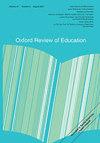坦桑尼亚教师隐性社会目标在教学改革中的作用
IF 2.1
3区 教育学
Q1 EDUCATION & EDUCATIONAL RESEARCH
引用次数: 4
摘要
撒哈拉以南非洲地区的教育改革往往不成功,可以说是因为它们没有考虑到教师选择的社会和文化背景。在坦桑尼亚农村进行的两项研究考察了参加教师专业发展方案的教师的教学决策。教师反思了他们自己进行教学活动的决定,研究小组对此进行了观察,并在小插曲中反思了教师所做的决定。研究结果表明,教育决策受到团结、合作和公平的社会目标的影响。教学选择也受到避免让学生尴尬、解决学生反应一致性问题以及学生对老师讲话缺乏信心的需要的影响。研究结果广泛支持坦桑尼亚教师在课堂上追求隐性社会目标的假设,其中一些目标与历史上农业社会的文化有关。教师可能会抵制不支持这些社会目标的新教学法。我们不认为文化价值观是“障碍”,而是认为教师专业发展计划,特别是早期教育的教师专业发展方案,应该设计符合教师文化塑造的社会目标的教学活动,同时忠实于这些活动的学习目标。本文章由计算机程序翻译,如有差异,请以英文原文为准。
The role of teachers’ implicit social goals in pedagogical reforms in Tanzania
ABSTRACT Pedagogical reforms in sub-Saharan Africa have often been unsuccessful, arguably because they fail to account for the social and cultural context of teachers’ choices. Two studies in rural Tanzania examined the pedagogical decisions of teachers taking part in a programme of teacher professional development. Teachers reflected on their own decisions to conduct teaching activities, which were observed by the research team, and on the decisions taken by teachers in vignettes. Results suggested that pedagogical decisions were influenced by the social goals of togetherness, cooperation, and fairness. Pedagogical choices were also influenced by the need to avoid embarrassing students and to address conformity among student responses and students’ lack of confidence in addressing teachers. The findings broadly support the hypothesis that Tanzanian teachers pursue implicit social goals in their classroom, some of which are associated with the culture of historically agricultural societies. Teachers may be resistant to new pedagogies which do not support these social goals. Rather than seeing cultural values as ‘barriers’, we argue that teacher professional development programmes, particularly for early years education, should design teaching activities which are consistent with the culturally shaped social goals of teachers while remaining true to the learning goals of those activities.
求助全文
通过发布文献求助,成功后即可免费获取论文全文。
去求助
来源期刊

Oxford Review of Education
EDUCATION & EDUCATIONAL RESEARCH-
CiteScore
5.20
自引率
0.00%
发文量
39
期刊介绍:
The Oxford Review of Education is a well established journal with an extensive international readership. It is committed to deploying the resources of a wide range of academic disciplines in the service of educational scholarship, and the Editors welcome articles reporting significant new research as well as contributions of a more analytic or reflective nature. The membership of the editorial board reflects these emphases, which have remained characteristic of the Review since its foundation. The Review seeks to preserve the highest standards of professional scholarship in education, while also seeking to publish articles which will be of interest and utility to a wider public, including policy makers.
 求助内容:
求助内容: 应助结果提醒方式:
应助结果提醒方式:


